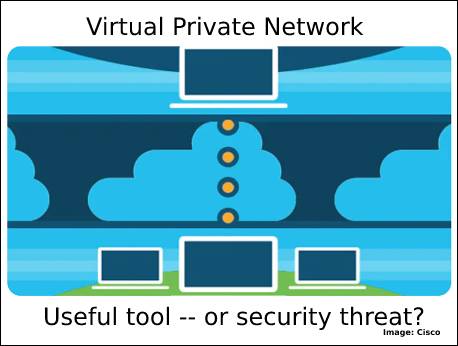
September 8 2021 (updated Sep 10): In its report submitted to the Indian Upper House or Rajya Sabha on August 10, the Parliamentary Standing Committee on Home Affairs is known to have proposed that Virtual Private Networks or VPN services should be banned in India because of the security threat they pose.
This recommendation,is being viewed with some astonishment by the tech community, since it seeks to block users from what is generally perceived to be a very useful tool for privacy – and more importantly in the current environment – a crucial enabler for secure WorkFromHome.
A virtual private network (VPN) creates a private network across a public network like Internet and allows users to send and receive data , tunnelling through the public networks but working as if they were on their own network. They achieve this by encrypting the data moving to and fro and hiding the users’ identity or in this case their Internet Protocol or IP address.
This today, allows millions of Indian tech professionals, call centre and customer care agents to work from the safety of their homes, while the data they send or receive –it could be private details about a customer, his or her complaint, a financial transaction for online purchase -- moves securely and privately on their own dedicated networks, even while they harness the public internet. Indeed the entire premise of employees working on company business on their on secure networks, while located anywhere in the world is made possible only because of VPNs.
That is why IT professionals are surprised at the suggestion mooted by Standing Committee that the Union Ministries of Home and of Electronics and Information Technology join with Internet Service Providers , to block VPN services.
It is true the same VPN which helps corporates protect the integrity of their data networks also enable Net baddies to bypass cyber security and retain their anonymity online. But banning the use of VPNs -- if indeed that is the suggestion made, seems like throwing the baby out with the bath water.
Realism suggests that unless the government intends to control the Internet as a whole in a manner, and to a degree ,not hitherto practised in India, it would not be feasible or prudent to outlaw VPNS as a class.
Beyond corporate networks, many lay users of Internet accounts, install VPNs to protect their identity from scammers and cyber criminals. Most Internet Security packages that consumers subscribe to, now include a free option to activate a VPN.
Among the first to comment on the purported moves against VPNs in India, the Economic Times in a editorial this morning says:
"The government should turn down the recommendation of Parliament’s Standing Committee on Home Affairs to ban virtual private networks (VPNs) in the country. The committee felt that VPNs permit cybercriminals to skulk behind the anonymity these provide and launch attacks on their targets. On balance, VPNs enable, rather than hinder security… . Business security as well as individual liberty both favour VPNs…To ban VPNs would be to shoot ourselves in parts more sensitive than the foot."
Related resources:
Parliamentary Committee reportedly wants to ban VPN services: Why it should worry India Inc - The Financial Express
Virtual private network - Wikipedia
What Is a VPN? - Virtual Private Network - Cisco
Shed security state obsession - The Economic Times (indiatimes.com)
Don’t ban VPNs: The pros definitely outweigh the cons - The Financial Express